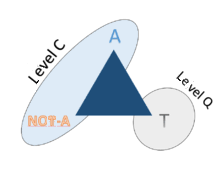
The included third of physics and thought
The fact that we are trapped in dualism, A and not-A, Being is and Non-Being is not, and now transformed into political thought as if nature and society were just always two options in conflict with no third (or even the fourth and fifth options) is an outdated thought if we look at the logical paradox developed by the physicist Barsarab Nicolescu that finds parallels not only in quantum physics (photo), but also in social and ontological thinking: the third option.
and not-A, Being is and Non-Being is not, and now transformed into political thought as if nature and society were just always two options in conflict with no third (or even the fourth and fifth options) is an outdated thought if we look at the logical paradox developed by the physicist Barsarab Nicolescu that finds parallels not only in quantum physics (photo), but also in social and ontological thinking: the third option.
So much so that this is true that Barsarab’s own text that calls for a reform of Education and Thought (Barsarab, 1999) indicates that this change can be seen as a way out of the center of a crisis greater than physical or logical issues, says Barsarab : “One thing is certain: a large gap between the mentality of the actors and the internal development needs of a type of society invariably accompanies the fall of a civilization”, or said in another, more ontological way, between Being and non-being -Being there is a state of Non-Being that breaks dualisms and paradoxes.
Both Barsarab’s letter that calls for an education reform, and other thinkers such as Edgar Morin and others perceived a crisis in modernity with roots in thought and education, the theorist of the Included Third T, gives a worrying sentence: “The risk is enormous , because the continuous expansion of Western civilization, on a global scale, would make the fall of this civilization equivalent to the burning of the entire planet, in no way comparable to the first two world wars”.
There is also a linear and monodirectional thinking where intentionality is always polarized and creating a “single” and monochromatic path, with the eternal danger of authoritarianism and misuse of power, to detente it will be necessary to have a more open world where everyone is included and not just what is convenient for power.
Education must support and assist this context, Barsarab says in his letter: “The harmony between mentalities and knowledge presupposes that such knowledge is intelligible and understandable. But can this understanding still exist, in the era of the disciplinary big bang and extreme specialization?”
The harsh reality of the pandemic shows that we oscillate between true solidarity and detente to face the crisis, and the opportunist polarization that wants to take advantage of the deaths and deviations of a poorly managed health crisis, in some countries more, but in almost all .
Barsarab’s sentence, which seems harsh, is not: “Is there something between and across disciplines and beyond each and every discipline? From the point of view of classical thought there is nothing, absolutely nothing. The space in question is empty, completely empty, like the vacuum of classical physics”, in this epoché (the Greek vision of emptiness) a true philosophy can flourish, even when it is not (the suspension of judgment, new horizons beyond the pre -concepts, etc.) is what it is.
NICOLESCU, Basarab. The manifesto of transdisciplinarity. Trans. Lúcia Pereira de Souza. Brazil, São Paulo: Trion, 1999.









